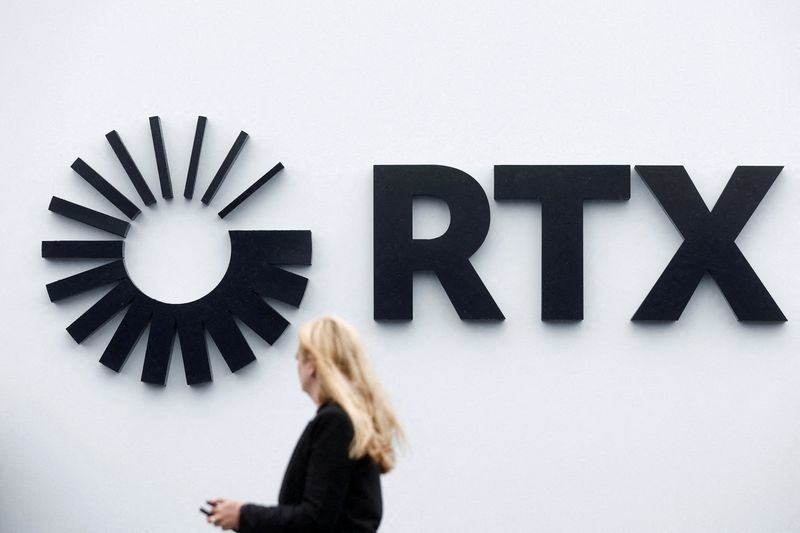RTX engine issue will ground 350 planes per year through 2026
2023.09.11 13:12

© Reuters. FILE PHOTO: Visitor passes the Raytheon Technologies Corporation (RTX) logo at the 54th International Paris Air Show at Le Bourget Airport near Paris, France, June 22, 2023. REUTERS/Benoit Tessier/File Photo
By Valerie Insinna and Abhijith Ganapavaram
(Reuters) -RTX Corp shares hit a two-year low on Monday after it announced that hundreds of Airbus A320neo jets will be grounded through 2026 as its Pratt & Whitney engines unit removes geared turbofan engines (GTF) for quality checks.
As the result of a powder metal defect that could lead to the cracking of engine components, which RTX first described in July, the company now estimates it will pull 600 to 700 engines off jets for inspections and take a $3 billion charge in the third quarter, said RTX, formerly Raytheon (NYSE:).
Repair work, which RTX CEO Greg Hayes initially expected would take 60 days, is now projected to last up to 300 days per engine. An average of 350 jets could be grounded per year through 2026, with as many as 650 jets sitting idle in the first half of 2024.
The new financial disclosures and lengthening work scope are likely to add to customer frustrations on the beleaguered GTF engine, which has been plagued by durability problems that have forced airlines to park jets.
RTX shares hit an over two-year low of $77.18 in early trade before recovering slightly to $77.57 by midday. Airbus shares were down 0.8%.
RTX anticipates an up to $3.5 billion pre-tax hit to its profit over the next several years as a result of the problem. It lowered its $9 billion free cash flow goal for 2025 to approximately $7.5 billion, and decreased its projected reported sales figure for 2023 by $5.5 billion.
European low-cost airline Wizz Air said on Monday that its initial estimates indicate capacity could be reduced 10% in the second half of 2024 due to the issue.
A spokesperson for German carrier Lufthansa said it was evaluating the situation.
US CARRIERS HAVE LARGEST EXPOSURE -JEFFERIES
Of U.S. carriers, Spirit Airlines (NYSE:), JetBlue Airwaysand Hawaiian Airlines have the largest exposure to the GTF problem, according to Jefferies. Spirit, JetBlue and Hawaiian did not immediately return a request for comment.
Hayes acknowledged on a call with investors that the problem “will have a significant impact on our customers,” with executives stating it will financially compensate carriers.
Robert Stallard, an analyst with Vertical Research Partners, said the RTX charges were “larger than expected” given initial estimates.
German partner MTU Aero Engines (OTC:), which controls 18% of the GTF program, said its own revenues and profit could be affected this year but it was too early make a precise assessment.
Airbus said it was supporting customers as they work with RTX to resolve the issue, and that the problem is not expected to impact 2023 deliveries or the planned production ramp up in 2024.
The quality issue relates to a “rare condition” in powder metal used to manufacture engine parts, such as high pressure turbine disks and high-pressure compressor disks, that could result in micro-cracks and fatigue.
During a production ramp up in 2015, a microscopic contaminant was introduced into the powdered metal made by RTX subsidiary HMI in Clayville, New York, which could not be detected by the company’s previous inspection methods, Hayes said.
“At last count there have been nine changes to the process to ensure the purity of the powder,” said Hayes who added he is “confident” the problem is resolved.
The company expects to release a service bulletin in the next 60 days laying out an inspection protocol for high pressure turbine disks and compressor disks, and will replace as many disks as possible during shop visits, executives said.








